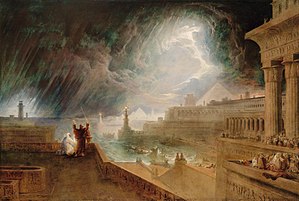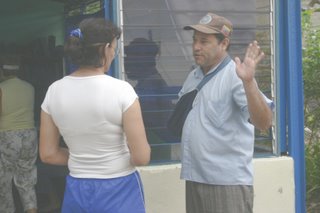
More news on the Haiti front, or rather the frontier between Haiti and the Dominican Republic. Last week Luz Maria and I met with Pastor Sergio Maita, who had just returned to Caracas following a week or two of volunteer service there. Sergio, a young Venezuelan man who was ordained with me in December 2009, traveled with Ted and Rebecca Krey, former missionaries to Venezuela who are now based in the Dominican Republic, to the bordertown of Jimani where they offered what assistance they could in a hospital that had become a refuge for earthquake victims. Sergio told us that he had taken a lot of pictures of trip to the Dominican Republic, but did not feel like sharing everything that he had seen in he hospital, for the suffering was very great.
On occasions like the earthquake in Haiti, there always are those try to draw grand conclusions about the misery. Some want to say that such suffering on a grand scale "proves" there is no God, or at least not a loving and merciful God. The problem for these people is that denying the existence of God does not relieve any of the pain experienced by earthquake victims or others one bit, or bring those that died back to life. Yet without an absolute point of reference, there is no basis for saying the pain and death in Haiti was "unjust" or "excessive" or anything else. The world is what it is, and apart from faith in God, there is little reason to think our efforts to change it will make any difference, that there is any hope for anything better (for even the concept of "better" has no significance) or that there is any point in helping those less fortunate than ourselves. Far from the existence of suffering on a grand scale disproving God's existence, only faith that God will one day provide recompense for those who have suffered unjustly, and judgment for the wicked who have evaded punishment by human courts and the natural consequences of their misdeeds, helps one make any sense at all of the whole business.
 Image via Wikipedia
Image via Wikipedia
On the other hand, there are those who want to see the earthquake as a sign of God's wrath directed specifically at Haiti, perhaps for the worship of voodoo gods. In the same manner, the Maundy Thursday earthquake that devastated Caracas in 1812 was said by some to be a sign of God's displeasure with the Venezuelan War of Independence from Spain. This error, unlike the first, claims belief in the Holy Scriptures, but this is not true.
According to the Bible, certain calamities were indeed signs of God's wrath against the wicked and the disobedient. Old Testament examples include the Great Flood, the Ten Plagues of Egypt. various afflictions suffered by the Israelites in the desert, the destruction of the Assyrian king Sennacherib's army (1 Kings 19:35), and many more. In the New Testament, we have the death of Herod Agrippa I (Acts 12:21-25) and the deaths of Ananias and Sapphira (Acts 5:1-11). But the entire book of Job and other passages of the Old Testament are devoted to refuting the idea that bad things only happen to bad people, and that the severity of the disaster reflects the level of God's wrath.
In the Sermon on the Mount, Jesus said that God makes the sun to rise on both the evil and the good, and sends rain to both the just and unjust (Matthew 5:45). In Luke 21:25, He said the signs of the end-times will include "great earthquakes, and in various places, famines and pestilences," not to mention wars between nations and everywhere persecution of the faithful. These terrible events are not to be interpreted as specific judgments against the wicked, but rather as general signs that the great and final Day of Judgent is approaching.
We understand the significance of certain past events, such as the Great Flood and the Ten Plagues, based on the authority of divinely inspired Scriptures. Outside the Scriptures, there is no such authority and it is presumptuous to second-guess God. We know nothing of His nature and will outside of what He has chosen to reveal to us. The Bible contains all we need to know for our salvation, and there will be no more divine revelations until the glorious fulfillment of God's plan for the world in the second coming of Christ.
Thus we find the final word on this topic in Luke 13. Jesus was asked an event that caused a lot of stir and consternation back in that day. It was the massacre of Galileans in the Temple, ordered by Pontius Pilate (those that think the New Testament portrays Pilate as a fundamentally decent fellow, please note), such that their blood mingled with the blood of their sacrifices to God. Essentially, both questions were put to Jesus. If the Galileans had done nothing to deserve death, where was the just and merciful God during this massacre? And if they had done something especially deserving of God's judgment, what was it?
 Image via Wikipedia
Image via Wikipedia
Jesus responded by reminding them of an even more puzzling event (the apparently senseless deaths of 18 men in the collapse of the tower in Siloam) and answered both questions in this way:
Neither the Galileans or the 18 men in Siloam deserved death any more than anyone else. However, all humans stand equally condemned under God's law, and deserve not simply physical death, but eternal damnation. By God's grace, all who believe will receive forgiveness of sin and eternal life through the blood of Christ, but with few exceptions, no one will escape physical death (the few exceptions being Enoch, Elijah and those still living when the Lord returns). While we may have the promise of eternal life in heaven, none of us are guaranteed one year, 20 years or 80 years on this earth. So the question we must ask ourselves is not why this individual or that group of people had to die at a particular time and in a particular manner, but why we ourselves still are drawing breath. If we still are alive, God still has a purpose for us here. We may not know everything about this purpose, but He has revealed enough in His Word wor us to respond in faith. So, as Jesus said, we must not allow ourselves to be distracted by the petty pleasures of the world, but remain alert and watchful for opportunities to serve God and our fellow man.
Mirror images talking to each other

Luz Maria and I spent the last week of January in Caracas at a seminar on "the means of grace." Our instructor was Pastor German Novelli. Born in Maracaibo, Venezuela, and confirmed in the Lutheran Church of Venezuela in 1983, German Novelli some years ago left his native country and embarked on on a geographical and spiritual odyssey that led him to Mexico, Puerto Rico, Canada, and finally the Wisconsin Synod seminary in Mequon, Wisconsin. He now is the pastor of a Latino mission on Milwaukee's South Side.
Mequon, Wisconin, by the way, is also the location of the Lutheran Church - Missouri Synod's Concordia University, Wisconsin and Trinity Luth¡eran Church of Freistadt, the oldest Lutheran congregation in the state (and of which my great-great-grandparents were founding members).
I lived on Milwaukee's South Side from 1986 to 1995, so it was interesting to compare notes with Pastor Novelli on our impressions of Wisconsin and the Milwaukee area in particular. We were like two mirror images talking to each other: the Venezuelan serving as the pastor of a mission in Milwaukee and the former Milwaukeean serving as the pastor of a mission in Venezuela. I shared with him some of my fondest memories; the Lake Michigan shoreline in summertime, the Mitchell Park Conservatory, eating real Mexican food at the Acapulco Restaurant.
 Pastor Novelli shared with me the thesis that he wrote for his masters in divinity degree on Wisconsin Synod mission work in Latin America. Active in the region since 1964, the Wisconsin Synod's missionary efforts in the past focused on Mexico, Puerto Rico and Colombia.
Pastor Novelli shared with me the thesis that he wrote for his masters in divinity degree on Wisconsin Synod mission work in Latin America. Active in the region since 1964, the Wisconsin Synod's missionary efforts in the past focused on Mexico, Puerto Rico and Colombia.Today the Wisconsin Synod supports what it calls its LATTE team. LATTE stands for Latin American Traveling Theological Educators. Latin American because work is done in all of the mission fields in Latin America—Mexico, Puerto Rico, Colombia, Dominican Republic, Haiti, and Brazil. Traveling because visits are made to each field on a rotating basis. Theological Educators because missionaries serve as the seminary professors of the men who desire to be pastors in their national churches. The LATTE program has been functioning since 2003.
The Wisconsin Synod also has been active in Haiti earthquake relief.
Evangelical Lutheran Synod missionaries have been active in Chile and Peru for about 40 years. The ELS has established a seminary in Lima, Peru. Thirteen men have graduated and have been ordained and twelve vicars and students continue working with congregations and various groups.
Lutheran alphabet soup
The current-day ELS developed from a remnant of the old Norwegian Synod that refused to merge with other synods in an effort to form one national Lutheran church-body in the United States. The end-result of these mergers is the Evangelical Lutheran Church in America. The philosopher Voltaire once said of the Holy Roman Empire, "It was neither holy nor Roman nor an empire." Much the same could be said of the ELCA, except that it definitely is headquartered in America. In fact, German theologian Wolfhart Pannenberg basically said as much:
"Here lies the boundary of a Christian church that knows itself to be bound by the authority of Scripture. Those who urge the church to change the norm of its teaching on this matter must know that they are promoting schism. If a church were to let itself be pushed to the point where it ceased to treat homosexual activity as a departure from the biblical norm, and recognized homosexual unions as a personal partnership of love equivalent to marriage, such a church would stand no longer on biblical ground but against the unequivocal witness of Scripture. A church that took this step would cease to be the one, holy, catholic, and apostolic church."
My great-grandfather, Andrew John (A.J.) Hemmingson, was a member of the old Norwegian Synod, which in fact had declared full pulpit-and-altar fellow with the Missouri in 1872. Pulpit-and-altar fellowship had been established between the Missouri and Wisconsin synods in 1868. From 1872 until the late 1950s, Missouri, Wisconsin and the ELS were partners in the Evangelical Lutheran Synodical Conference. The Synodical Conference was a strong voice for confessional Lutheranism in the United States and has never been entirely replaced. The federation broke up when the Missouri Synod began moving toward closer relation with the more theologically liberal American Lutheran Church (ALC).
Fellowship between the Missouri Synod and the ALC lasted only until 1981, when a majority of Missouri Synod delegates to its national convention voted to dissolve the relation because of a continued drift toward the theological left by the ALC. In 1988 the ALC was absorbed into the ELCA.
May God grant that the remaining confessional Lutheran church-bodies find the basis for doctrinally sound unity and strengthened mission work at home and abroad.
![Reblog this post [with Zemanta]](http://img.zemanta.com/reblog_e.png?x-id=cb56eedb-98ec-467f-8576-f71a6f548507)




